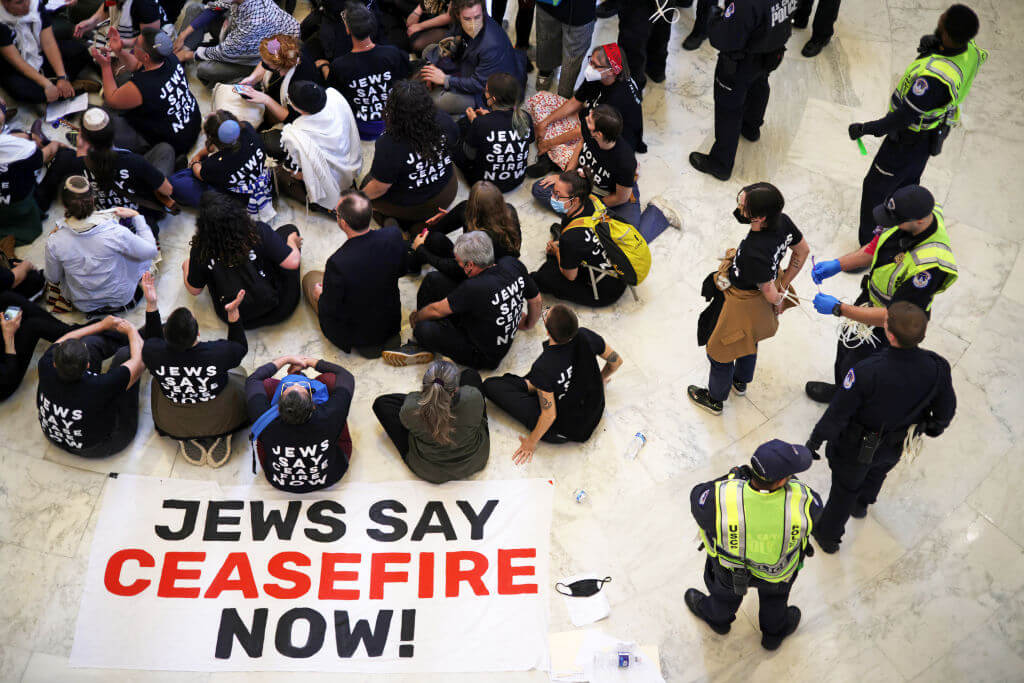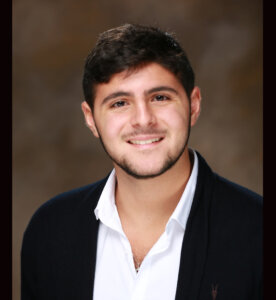Controversy over letter from Jewish day school alumni saying they were fed ‘false narratives’ about Israel
While some grads of Maryland’s Charles E. Smith Jewish Day School condemn Israel’s war on Gaza, other alumni call the critics ‘self-hating Jews’

Members of the Jewish Voice for Peace and the IfNotNow movement at a rally in Washington, D.C., calling for a cease-fire in the Israel–Hamas war. Photo by Alex Wong/Getty Images
Graduates of a well-known Jewish day school outside Washington, D.C., say their education was defined by “false narratives” about Israel, and are appealing to other alumni to help “break the cycle of ‘no matter what’ support for Israel.”
“If you are similarly struggling, questioning, or feeling alienated by the unequivocal support for Israel that continues to be upheld by JDS as an institution and by the broader Jewish community that raised us – you are not alone,” read the open letter signed Dec. 12 by roughly 130 graduates of the Charles E. Smith Jewish Day School in Rockville, along with several of their parents.
Hundreds of other alumni, teachers, staff and parents, pushed back with letters of their own. One of those ‘counter letters’ called the first letter “shameful in its impressive level of lies, propaganda, misinformation, and blatant falsehoods,” labeled the first letter’s signatories “self-hating Jews,” and said the criticism of their education “goes against every Jewish and Zionist value ingrained in us by our school and by our religion.” The writers of the other counter letter said they were shocked that their “fellow alumni would spread vicious blood libels about Israel like calling it an apartheid or colonial state.”

All three of the letters expressed horror over Hamas’ Oct. 7 attacks. Many in the school have close ties to Israel. A 22-year-old graduate of the school, Omer Balva, was killed on Oct. 20 in an anti-tank missile attack on the Lebanon border. Balva, a dual U.S.-Israeli citizen, had been called back to fight as a reservist in the Israel Defense Forces.
The letter critical of the school said the signatories’ “critique of Zionism and Israel is neither antisemitic nor a betrayal of Judaism or Jewish community; rather, these profound critiques stem from our commitment to Jewish values.” Describing Israel’s war on Gaza as “fueled by genocidal intent,” they said they were “struggling to reconcile the unquestioned support for Israel’s brutal assault” with “the Jewish values” they were taught.
One of the responses criticized the original letter as reflecting “sanctimony rather than empathy towards a people in profound mourning” while failing to “respect the agency of the Palestinian people, who govern their society in Gaza.”
Almost all of those who signed the letter taking the school to task graduated in the 21st century. Their relative youth reflects a larger pattern among American Jews, with younger generations taking a far more critical view of Israel.
Known as CESJDS, the school was founded in 1965 and bills itself as “one of the largest independent Jewish day schools in North America” enrolling about 900 students.
The school’s response
Meanwhile, the school also responded Monday with an email signed by board president Ayala Nuriely Kimel and Rabbi Mitchel Malkus, who heads the school.
“We were deeply hurt and disappointed by some of the views that were expressed,” they wrote.
The letter affirmed the school’s identity as “pro-Israel and Zionist,” saying it was founded as an institution “committed to Israel, its people, and the Jewish people’s right to self-expression in the land of Israel.”
While the school rejects “terms like apartheid and colonialism being applied to Israel,” they said they take “a dual narrative approach and expose our students to multiple perspectives in our Israel education, something that was not acknowledged by all our alumni.”
They said the school is committed to “pluralism” and a “wide expression of ideas, beliefs, and practices,” including “current students and alumni expressing strong opinions through debate, critique, and critical analysis.”
‘Cognitive dissonance’
In a post on the social media platform X, Yonah Lieberman, a 2009 graduate who signed the alumni letter, called the school’s response “embarrassing,” saying it “epitomizes the cognitive dissonance embedded in many Jewish orgs. Talk of teaching ‘dual narratives’ and ‘exposing our students to multiple perspectives’ yet never using the word occupation or mourning Palestinian life.” Lieberman describes himself as a co-founder of IfNotNow.
In an email to the Forward, Li Silverman, a 2011 graduate who helped draft the original open letter, also said the school’s response demonstrated that “a litany of mainstream ideas and perspectives about Israel’s treatment of Palestinians” are “effectively forbidden,” by the administration, and noted its rejection of “terms like apartheid and colonialism.”
“How can we reject a critique without learning about the case for it?” asked Silverman.
Asked for examples of their miseducation, Silverman said students had different experiences in different classes over the decades. “For us, the contention has never been learning too much or not specifically enough about Israel as an idea, project, and now state; it’s about what we didn’t learn,” Silverman said. “Many of us heard from vanishingly few Palestinian speakers, while celebration of Israel and the IDF was mandated and institutionalized.”
All the letters are being promoted by word of mouth, though some alumni have posted them on social media.
Longstanding debate in Jewish education
The letter critical of the day school is the latest example of a segment of American Jews rejecting the unconditional support for Israel they were raised with. That’s the theme of the 2023 documentary film Israelism, which features Simone Zimmerman, a graduate of Kadima Day School and De Toledo High School in Los Angeles. The film has generated controversy at showings on college campuses, with screenings canceled and sometimes rescheduled amid rancorous debate.
Zimmerman is co-founder of IfNotNow, an organization that describes itself as working “to end U.S. support for Israel’s apartheid system.” In 2017, IfNotKnow launched a campaign on social media called #YouNeverToldMe, in which young Jews said their Jewish education ignored the history and experiences of Palestinians. Writing about the campaign in the Forward that year, Reconstructionist Rabbi Sarah Brammer-Shlay said: “As a generation, we were betrayed by the institutional Jewish world which told us stories of Israel’s glories but no stories of the horror and impact of occupation on Palestinians.”
The notion that progressive Jewish day schools in the U.S. might unintentionally encourage kids to question support for Israel rather than cementing Zionist sympathies emerged years before the war in Gaza.
A 2011 academic paper called “Values in Tension: Israel Education at a U.S. Jewish Day School,” attributed the ambivalence toward Israel among day school graduates to the teaching of “contradictory values.” Author Sivan Zakai, a professor at Hebrew Union College in Los Angeles, described those contradictions as “tensions between an open exchange of ideas and a non-debatable loyalty to Israel; between pluralism and Zionism; and between inclusivity and expertise.”
A 2021 Times of Israel opinion piece went so far as to contend that the “strategy” of sending kids to Jewish day schools to “avoid anti-Israel bias in the classroom” has “produced a generation of anti-Zionist Jews.”
Silverman said the writers of the original open letter were “proud to build on the incredible work of other anti-occupation Jewish activists. We stand in solidarity with all current and former Jewish Day School students struggling with the dissonance between what their communities say about Israel and Palestine, and what they’ve experienced in their own life and learning.”
The school declined a request for comment, saying the school head was too busy to speak this week.
Editor’s note: This version of the story clarifies which quotes come from which counter letter and links individually to each letter.
A message from our Publisher & CEO Rachel Fishman Feddersen

I hope you appreciated this article. Before you go, I’d like to ask you to please support the Forward’s award-winning, nonprofit journalism so that we can be prepared for whatever news 2025 brings.
At a time when other newsrooms are closing or cutting back, the Forward has removed its paywall and invested additional resources to report on the ground from Israel and around the U.S. on the impact of the war, rising antisemitism and polarized discourse.
Readers like you make it all possible. Support our work by becoming a Forward Member and connect with our journalism and your community.
— Rachel Fishman Feddersen, Publisher and CEO




























